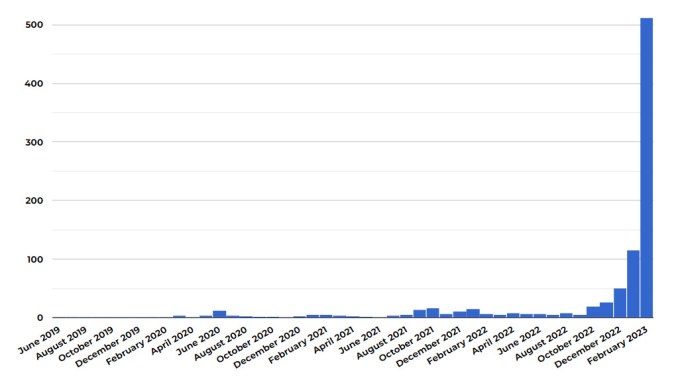Across the 17-year history of Clarkesworld, a renowned literary magazine of science fiction and fantasy, authors have speculated about how evolving, futuristic technology will impact our world. Now, editor and publisher Neil Clarke is living through a debacle that could very well be a sci-fi story in its own right: His magazine in being uncontrollably inundated by short-story submissions created with AI tools.
“It is ironic, I’ll say that much,” Clarke told TechCrunch. Clarkesworld has a reputation for always being open to story submissions, whereas many short-fiction publishers will only take submissions in certain short windows. But for the first time, submission volume got so out of hand that Clarke made what he calls a “spur-of-the-moment decision” to close the submission portal (in the past, Clarkesworld has only briefly closed when upgrading its website or software).
“It’s easy with these tools to churn out hundreds of thousands of works in the time that a human author would produce maybe one or two,” Clarke told TechCrunch. “So what we basically have is a room of screaming toddlers, and we can’t hear the people we’re trying to listen to.”
Clarke isn’t being dramatic. In a blog post, he shared a graph spanning from June 2019 to February 2023, which shows how many monthly submissions his staff flagged as spam. Until the beginning of this year, spam submissions never exceeded 25 per month, while many months had no spam whatsoever. Before closing submissions on Monday, Clarkesworld had received more than 500 spam submissions in the month of February alone. For context, Clarkesworld received around 11,500 submissions in 2022, per Clarke’s blog.

Like many controversies around AI-generated visual art, these kinds of short stories call up questions about plagiarism. To put it broadly, OpenAI’s models like ChatGPT and GPT-3 are essentially trained on the text of the internet — that includes copyrighted stories from publications like Clarkesworld.
If an AI-generated story merited publication in Clarkesworld, then the publication would have to deal with certain ethical questions. But Clarke says that these stories aren’t even any good. These text-generating algorithms are not built to entertain or surprise us; they analyze patterns in massive datasets to respond to requests and determine what is most likely the desired output.
DALL-E, Midjourney and other AI image generators can make some visually interesting, if not derivative, works — but when you scroll past your friend’s AI-generated avatar on Instagram, you’re not spending much time with the work. If you’re reading a 5,000-word piece of fiction, you’re going to need to dedicate around 15 minutes or more to a story that is fundamentally designed to be as predictable and boring as possible.
Clarke’s decision to close submissions has breached containment, escaping the insular science fiction community to spark yet another round of internet debate about whether or not AI can create good art.
“I’ve never had a tweet go viral like that before,” Clarke said. “There’s the people who see this as furthering an agenda — AI is bad, or AI is fantastic and we should be embracing it … I get a lot of that. Clearly, I just want to figure out how to know whether or not I’m working with someone who’s serious here.”
Submissions are currently closed. It shouldn't be hard to guess why.
— clarkesworld (@clarkesworld) February 20, 2023
For Clarke, his staff, and the hopefuls who submit their stories, this deluge of submissions means that there is less time to dedicate to working with real, emerging sci-fi writers who have a genuine interest in improving their writing. Instead, Clarke is stuck sifting through banal prose.
“It’s essentially the old story of all the monkeys working who will someday replicate Shakespeare,” Clarke told TechCrunch. “But we’ve got to read through all of those to figure out which one is actually Shakespeare.”
Some software claims to be able to detect when a submission is plagiarized, or when it’s generated by tools like ChatGPT. But Clarke has not found these costly programs to be very accurate. TechCrunch’s Kyle Wiggers tested seven different AI text detectors, finding that none of them were particularly effective. OpenAI even estimates that its own tool for detecting synthetic text misses 74% of AI-generated text.
It’s a difficult problem to solve for venture-funded companies with multi-billion-dollar valuations, let alone an independent science fiction publisher.
Clarke has a particular interest in publishing international authors, but he noticed that writers who are not native English speakers were sometimes being flagged as spam by these detectors.
“We’re conscious of the fact that what might look suspicious might actually just be a quirk of the way they’ve learned English,” Clarke said. This makes it even less feasible to use any sort of automated scanning software to sift through stories.
This deluge of submissions is not coming from bots — Clarke thinks these are real people who are trying to make quick cash with minimal effort. Even Amazon has seen a steep increase in AI-generated, self-published e-books.
“Most of these submissions that are coming to us are not coming from the science fiction community,” he said. “They’re coming from people who have been following various side hustle blogs or YouTube channels or TikToks, and they’re just churning something out and sending it on in hopes of making a quick buck.”
Clarke said that some peer sci-fi publications are experiencing the same issues, particularly ones that are always open, or who pay higher rates. It’s hard to say why sci-fi magazines are bearing the brunt of the AI-driven deluge — aside from the irony of it all, it could be because sci-fi publications tend to pay more. In order to be considered a “professional” short fiction market by the Science Fiction & Fantasy Writers Association, publications must pay a minimum of eight cents per word. That may not seem like much, but publications printing non-genre literary fiction or poetry don’t have these same regulations, meaning that they often pay even less, or don’t pay at all. So, spammy submitters might not consider those markets worth their while.
“We found a couple of the primary sources for lists that have us on it as a place to send your submissions that are being linked to by these chatbot gurus, telling people how to make money,” Clarke added. “We’ve been monitoring the traffic coming from those sites, so we know what their source is, and then I have my friend who’s at another magazine, who is also on that list. And we can see clearly that, they’re lower on the list, and we’re both getting submissions from the same person, and they’re always a few minutes later. So they’re working their way down the list.”
Clarke hasn’t shared when he will open his magazine up for submissions again, but for now, he’s exploring ways to deter spam.
“You’ve got a very grey area. This is a new problem the industry is dealing with, and it’s gonna take some time to shake those details out,” Clarke said. “So my general advice to authors is, if you think it might be suspicious, don’t do it.”
Most sites claiming to catch AI-written text fail spectacularly






























Comment